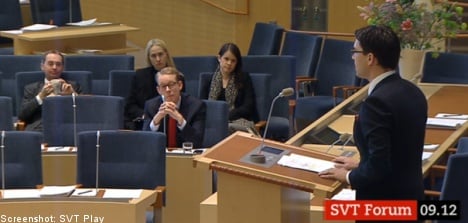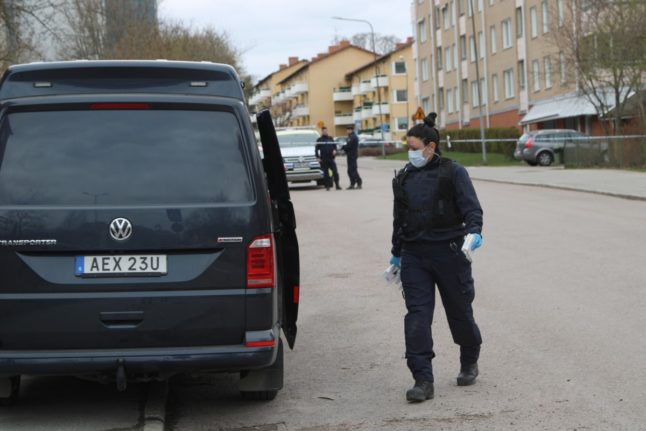Sweden Democrat leader Jimmie Åkesson opened the debate by arguing that Sweden’s immigration policy was “extreme” and “irresponsible” in an EU context.
“It is obvious that generally speaking (the government) wants to see an increase in immigration to Sweden,” he said, arguing that the agreement is a document in favour of “unfettered mass immigration”.
Migration minister Tobias Billström underlined that the agreement provided for a legal basis for long-term migration policy.
“The government and the Green Party has taken a joint responsibility for migration and asylum policy. A regulated immigration. An orderly process… Which recognises that there is another migration aside from the involuntary.”
Billström devoted much of his time at the speaker’s podium to underlining the responsibilities of the EU in formulating a joint migration and asylum policy and argued that the agreement was a contribution to this.
“Yes Sweden takes in a large number of asylum seekers – but that is not the problem. The problem is that a small number of states do a lot, while a large number do very little,” he said during the debate.
He laid out several initiatives contained in the agreement including more resources to ensure that those denied asylum leave the country, as well as a review of the situation of the “papperslösa” (literally: without documents) to access emergency healthcare.
Billström argued that Sweden could be a model to other EU states to resist the insular winds blowing across the continent, pointing out that the key to Sweden’s success is its openness and ability to attract newcomers.
Åkesson later complained at the use of the Swedish term “papperslösa” (Literally: without documents), calling it “newspeak”, in a reference to George Orwell’s 1984.
“They should be called what they are – illegal immigrants,” Åkesson said, arguing that the agreement encouraged illegality by making it easier for those who have not applied nor been accepted for asylum to access Swedish welfare.
In a opinion article in the Svenska Dagbladet daily on Wednesday morning, Åkesson claimed that there were 60,000 people in Sweden who had been denied asylum but remained in the country, based on the number of completed deportations.
Tobias Billström rejected the figure, saying that it ignored the fact that most people who are denied asylum leave the country of their own free will.
Fredrik Federley of the Centre Party attacked the Sweden Democrats line of reasoning on welfare and challenged Jimmie Åkesson to confirm that he stood behind an agreement which gave, for example, pregnant women the right to give birth at Swedish hospitals regardless of status.
Federley also underlined the importance of labour migration to ensure that Sweden’s demographic challenge is met and questioned why qualified immigrants seek their success elsewhere.
“Why do migrants leave for England or Canada – because we are not able to contribute and provide opportunities,” Federley said.
Åkesson responded to Federley’s challenge by complaining at the tone adopted in his speech, while thanking the remainder of the speakers for the debate.
A significant part of the continued debate was dedicated to dissenting views of immigrants as an asset or a burden, with Ulf Nilsson of the Liberal Party (Folkpartiet) following a similar reasoning to the Moderate Party’s Tobias Billström in defending the proposal.
“The Alliance sees inward labour migration as an opportunity, sees the possibilities of the EU to build up a humane asylum policy and an open labour migration,” he said.
“The EU is the possibility we have, we need to give it a chance,” Nilsson concluded.
The agreement has been heralded as a statement that Sweden will not follow the perceived situation in Denmark, where the Danish People’s Party (Dansk Folkeparti – DF) has managed to gain a profound influence on migration and asylum policy.
Several speakers referred to this “Danish development” and also to research presented at Gothenburg University on Monday which showed that the harder the line adopted by the established parties within migration and asylum policy, the greater the support for the Sweden Democrats.
The study presented by Carl Dahlström and Anders Sundell indicated that the line adopted by the parties on the left of the political spectrum is particularly important, especially the Social Democrats.
The researchers questioned why established parties would adopt a tougher line when they appear to punished for it by the voters. Denmark is used as an example where the views of an anti-immigrant party are “contagious” for the others.
Christina Höj Larsen of the Left Party argued in the debate that this process has already begun and disputed that the agreement constitutes a means of blocking of the “Danish development”.
“Why adopt bad policy, and justify it by saying the alternative is even worse,” she said, arguing that Sweden needs clear answers on how the situation can be improved for many of the more vulnerable groups in society.
Emma Henriksson of the Christian Democrats took up this theme in her rejection of the classification of all those without documents to be “illegal”.
“These are people who reside in our country who have not applied to be here, or have applied and not been approved. But that does not make the people illegal in themselves; this human being retains the full rights to exist,” she said.
The Green Party’s Maria Ferm concluded the debate by expressing a hope that the agreement can form the basis of further constructive cooperation.
Ferm furthermore pointed out that Sweden is a wealthy country and doesn’t need to make a choice between developing social services, addressing poverty and tackling crime, and a humane asylum and open labour migration policy.



 Please whitelist us to continue reading.
Please whitelist us to continue reading.
Member comments